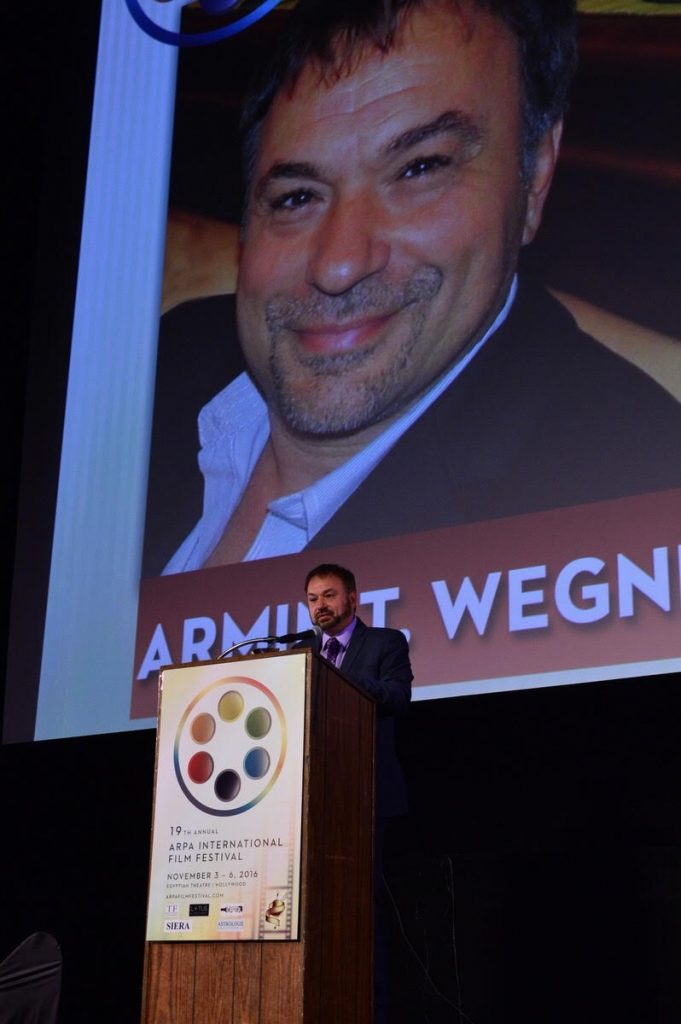Maronian: ‘Our Ultimate Goal Is Prevention of Future Genocides…’
Award-winning filmmaker Bared Maronian’s latest documentary film “Women of 1915,” tells the story of heroic Armenian and non-Armenian women who, during the tumultuous years of the Armenian Genocide, played an instrumental role in saving the lives of the innocent.
The documentary premiered in New Jersey in June, in an event sponsored by the Armenian Relief Society (ARS) of Eastern USA and attended by hundreds.

Maronian receiving the Armin T. Wegner Humanitarian Award at ARPA for ‘Women of 1915.’ (Photo: Sahag Melelian)
“The documentary, ‘Women of 1915,’ combines facts and emotion to honor these brave women of the Armenian Genocide, many of whom lost their lives, survived to create new lives, or were forced into lives that were not their own. Many women, Armenian, European, and American, also traveled great distances to rescue lives, even at the risk of their own. Among the women highlighted in the film are survivors, volunteers, and resisters, including survivor Aurora Mardiganian, American volunteer Mary Louise Graffam, diplomat Diana Apkar, and Danish missionary Maria Jacobsen,” Nayiri Panossian wrote in her coverage of the premiere for the Armenian Weekly.
The Armenian Weekly recently conducted a short interview with Maronian ahead of the Florida premiere of “Women of 1915.” The Florida premiere will take place at the Mardigian Hall in Boca Raton on Jan. 19 at 7 p.m. The screening will be followed by a question/answer session and a reception.
Below is the interview with filmmaker Bared Maronian.
***
Armenian Weekly: What made you decide to make a film focusing on the women who survived the Armenian Genocide?
Bared Maronian: While researching for “Orphans of the Genocide,” my previous documentary film, I discovered that behind every rescued genocide child, there was almost always a woman. In most cases this genocide orphan-rescue was mundane and based on the natural motherly instincts of Armenian women. However, what was more striking about this orphan-rescue mission was the fact that hundreds of non-Armenian women from around the world flocked into the killing fields and rescued thousands of Armenian women and children. While doing so they risked their lives and some even died while saving others.
I thought these women deserved to be put on a pedestal. Thus came the “Women of 1915” documentary.
A.W.: Who are some of the notable figures that the documentary features?
B.M.: We are featuring a number of prominent women in this film. One of them is Karen Jeppe, a Danish social worker who saved thousands of Armenian women from forced religious conversation. Another woman of 1915 we featured is, Victoria Artinian, who happens to be Steve Job’s adoptive grandmother.
A.W.: What type of research was done in order to compile the information for this documentary?
B.M.: We did both primary and secondary research during the pre-production phase of this film. We visited a number of research centers, such as Rockefeller Archive Center of New York and the Nubarian Library of Paris just to name a few. However, I think our most remarkable stories were uncovered by following leads that came to us from friends and acquaintances. These were powerful stories that have never been told before.
A.W.: Who is the intended target audience for this documentary?
B.M.: Both “Orphans of the Genocide” and “Women of 1915” are produced for the non-Armenian general public. Our screenings at focus groups suggested that both films were very well received by people from all walks of life.
“Women of 1915” was a 2016 Armen T. Wegner Humanitarian Award recipient at ARPA, a 2016 Regional Emmy Award Nominee, and a Best Documentary Award Winner at the 2016 Hamazkayin Pomegranate Film Festival in Toronto, where it was also given the Audience Choice Award and the prestigious Golden POM Achievement Award.
A.W.: What type of impact do you think this film will have in today’s world, given the fact that women in Syria and in other countries are experiencing similar struggles?
B.M.: What women have been experiencing in recent times in the Middle East under Daseh/ISIS rule, is ironically similar to the horrific indignities that the Armenian women went through a hundred years ago during the Armenian Genocide—latter on a larger systematic scale by direct orders from the Ottoman Turkish authorities. Our film is a persistent reminder of the already cliché notion that history repeats itself.
Our ultimate goal is prevention of future genocides through educational films such as “Women of 1915” and “Orphans of the Genocide.”
A.W.: Tell us more about the Florida Premiere. Are there any future showings scheduled?
B.M.: I’m truly excited about the Florida Premiere of “Women of 1915.” Florida happens to be my home state. The event is organized by our local Saint David Armenian Church and Armenian Relief Society (ARS) Sosseh Chapter of Florida.
The Florida premiere will take place at the Mardigian Hall in Boca Raton on Jan. 19 at 7 p.m. The screening will be followed by a question/answer session and a reception. It is recommended to reserve seats ahead of time.
In February and March, we are planning a few screenings in Canada and a number of European premieres in the United Kingdom and France.
Source: Armenian Weekly
Link: ‘Women of 1915’ Florida Premiere to Take Place on Jan. 19

